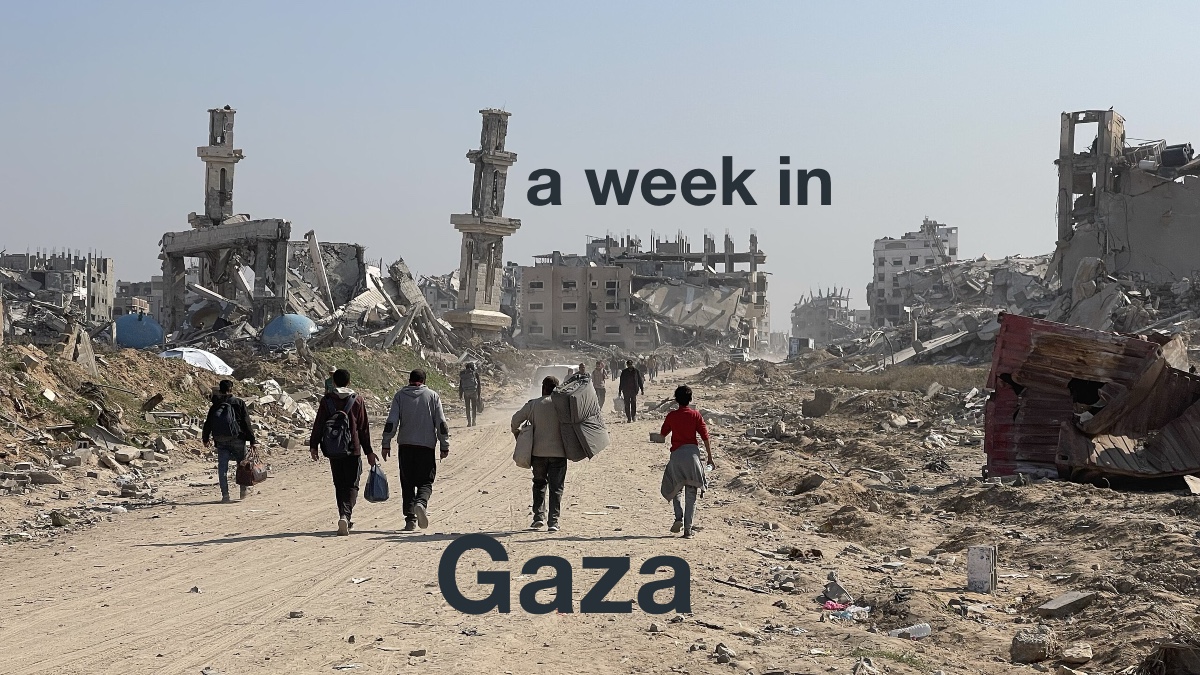From 3 to 10 August 2025, the conflict in Gaza saw rising civilian deaths, severe shortages of food and fuel, and a shift in Israel’s military strategy. Large protests in Sydney, Melbourne, and London, a German arms export freeze, and the collapse of ceasefire talks added to a week of significant developments on the ground and abroad.
Protests in Sydney, Melbourne, and London

On 3 August, a variously estimated 90,000 to 300,000 people took part in a march across Sydney Harbour Bridge under the banner “March for Humanity,” calling for an end to the conflict in Gaza. Among those present were journalist Julian Assange and several Australian politicians. Police initially attempted to block the protest, citing safety concerns. On the same day, a smaller demonstration in Melbourne was contained by police before crossing into the central business district, resulting in several arrests.
In London on 9 August, police arrested 466 people during a protest in Westminster against the UK government’s decision to designate the activist group Palestine Action as a terrorist organisation. Organised by the campaign group Defend Our Juries, the protest drew 500 to 600 participants. Demonstrators carried placards stating “I oppose genocide. I support Palestine Action.” Amnesty International and other organisations criticised the mass arrests as disproportionate.
Humanitarian Conditions in Gaza
Reports from Gaza’s Health Ministry on 3 August indicated that 119 Palestinians had been killed in Israeli strikes that day alone. The number of famine-related deaths rose from 175 on 3 August to 212 by 9 August, with nearly 100 children among the dead.
Aid access remains severely restricted. On 3 August, two trucks carrying a total of 107 tonnes of diesel fuel entered Gaza from Egypt—the first such delivery since March. Medical sources reported that Israeli fire killed at least 62 Palestinians over 2–3 August, including 38 people waiting for assistance at Gaza Humanitarian Foundation sites. According to humanitarian groups, more than 1,300 people have died near aid distribution points since the start of the conflict.
Military Operations and Strategic Shifts
On 4 August, Israel announced the end of its Beit Hanoun offensive in northern Gaza, citing a lack of strategic breakthroughs. Objectives such as recovering hostages, dismantling Hamas command structures, and relocating parts of the civilian population were not achieved.
On 8 August, Israel’s security cabinet approved a plan to occupy Gaza City, with a civilian evacuation deadline set for 7 October. Military and intelligence officials had reportedly advised against the move, warning of significant operational and humanitarian risks. The decision prompted public statements from Turkey and other states calling for coordinated opposition to the plan.
Diplomatic Developments
Ceasefire talks in Doha collapsed early in the week. Hamas subsequently stated on 4 August that it would allow the International Committee of the Red Cross access to hostages if Israel halted airstrikes and established permanent humanitarian corridors.
On 9 August, the German government announced that it would restrict arms exports to Israel, citing the worsening humanitarian situation. This marks one of the most significant policy shifts by a major European power since the current conflict began.
International Reaction and Outlook
Israel’s plan to occupy Gaza City has drawn condemnation from multiple governments and international organisations. Aid agencies have renewed calls for unrestricted humanitarian access, warning of further mass casualties from hunger and disease if current conditions persist.
The combination of escalating military plans, limited aid delivery, and political responses abroad has intensified the debate over both the conduct of the war and the international community’s role in addressing its consequences. Protests in Sydney, Melbourne, and London over the past week illustrate that public opposition to current policies is not confined to the Middle East but is manifesting in widespread civic action across different regions.
The situation remains fluid, with further developments likely in the coming days as Israel prepares for the Gaza City operation and diplomatic channels continue to explore possibilities for renewed ceasefire talks.
Discover more from psipook
Subscribe to get the latest posts sent to your email.
